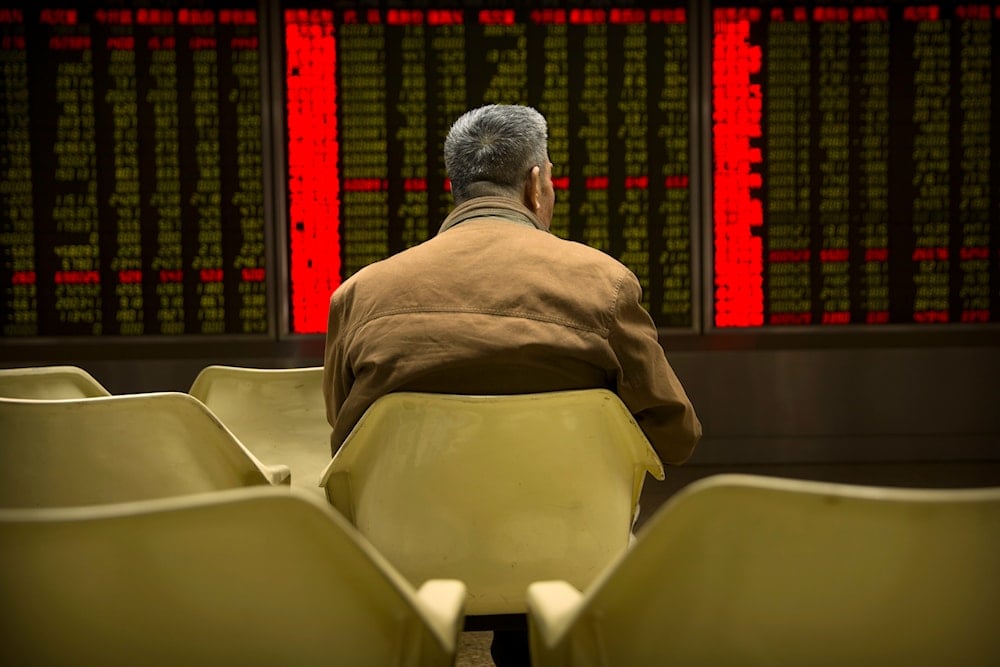China says open to US trade talks offer but wants tariffs 'scrapped'
China says it is evaluating a US proposal for trade talks, insisting negotiations cannot begin unless Washington cancels tariffs.
-

A Chinese investor monitors stock prices at a brokerage house in Beijing, on March 23, 2018. (AP)
China announced Friday that it is assessing a US proposal for renewed trade negotiations but made clear that any talks hinge on Washington's willingness to lift unilateral tariffs that have disrupted global markets and supply chains.
Punitive US tariffs, some reaching as high as 145% on Chinese goods, were enacted in April, prompting Beijing to impose retaliatory duties of up to 125% on a range of US imports.
While high-tech items such as semiconductors, smartphones, and computers have been temporarily exempted from tariffs by the US, broader trade tensions remain unresolved.
US President Donald Trump claimed this week that Beijing was seeking talks, adding, "There’s a very good chance we’re going to make a deal." However, China’s Ministry of Commerce countered that it was the US that made the outreach, and reiterated that progress would depend on Washington demonstrating "sincerity."
Beijing demands tariff concessions before dialogue
The Chinese Commerce Ministry stated that, "If the US wants to talk, it should show its sincerity to do so, be prepared to correct its wrong practices and cancel unilateral tariffs," adding that negotiations would be meaningless if the US did not reverse its tariff measures, warning that coercion or mixed signals would only worsen bilateral trust.
The statement said, "Saying one thing and doing another, or even attempting coercion and blackmail under the guise of talks will not work."
Wu Xinbo, director of the Center for American Studies at Fudan University, supported the official stance, noting that Beijing would not yield under pressure.
"Our attitude is: 'You must first take some action to show sincerity,'" Wu said, adding that only once US tariffs are withdrawn could China discuss issues like trade imbalances and US concerns over Beijing’s technological advancement.
On the other hand, the United States recently ended tariff exemptions for Chinese goods valued under $800, a move expected to impact consumer habits. Dozens of countries now face a July deadline to reach agreements with Washington or face higher, country-specific tariffs.
Meanwhile, data released Wednesday showed a surprise contraction in the US economy during the first quarter of the year, following a surge in imports triggered by Trump's new tariff strategy.
However, China is also facing headwinds. Factory activity declined in April, with officials citing a "sharp shift" in global economic conditions, and the Foreign Ministry acknowledged growing difficulties for export-driven industries, though it reiterated Beijing’s resolve.
Chinese analysts warn against one-sided talks
The Chinese government posted a defiant message on social media, vowing to "never kneel down!" and reaffirming its readiness to confront a prolonged economic conflict.
"China's position has always been perfectly consistent," the commerce ministry declared, adding, "If it's fight, we will fight to the end; if it's talk, the door is wide open. The tariff war and trade war were unilaterally initiated by the US side."
Ja-Ian Chong, a political analyst at the National University of Singapore, noted that both sides are under economic pressure but unwilling to appear weak. "Neither side wishes to look weak," he said.
Moreover, the ongoing trade war has strained the global supply chain and pressured both the Chinese and US economies, while China's reliance on exports and the US’ consumer-driven model have both come under stress.
Stephen Innes of SPI Asset Management described China’s tone as a potential softening of rhetoric.
“On paper, both capitals are waving détente flags,” he wrote, “But dig a layer deeper, and the path is still littered with landmines.”

 4 Min Read
4 Min Read








